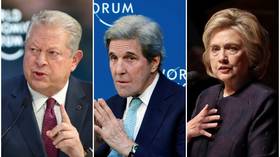Is it in the bag, Joe? 5 times the Democrats blew a winnable election

The polls look healthy for Joe Biden as the US election draws ever nearer. But victory isn’t a fait accompli, as his party has a rich history in snatching defeat from the jaws of victory.
Presumptive Democratic nominee Joe Biden has opened up a commanding lead in the national polls and is faring well in the battleground states that will decide the outcome in the Electoral College.
Despite this positive outlook, the Democrats still face a considerable hurdle – themselves. Four months out from the election, it is worth revisiting the five times in recent history when the Democrats blew winnable elections.
1988
Many voters were restless for change in 1988. After the trauma of the 1987 Wall Street crash and the Iran-Contra affair, President Reagan was still fairly popular, but much of the lustre had worn off.
The excesses of the new gilded age had been laid bare by the meltdown on the stock exchange and by the rising debt and deficits. Vice President George H.W. Bush lacked the charisma of the Gipper, and there wasn’t any obvious galvanizing incentive for his campaign.
The Democrats had nominated Michael Dukakis, a son of Greek immigrants who, as governor of Massachusetts, had presided over a period of economic growth known as the ‘Massachusetts Miracle’. Dukakis emerged from the Democratic convention in a buoyant mood. Polls had him almost 20 points ahead of Bush.
Winning the election would largely be a matter of staying on message and playing it safe, keeping a shrewd eye out for any tricks from the other side, counterpunching well against the opposition’s attempts to shape the narrative, organizing competent media set-pieces well in advance to avoid any self-inflicted wounds, and putting in competent, assertive and drama-free debate performances.
The inadequacies of the last Democratic president, Jimmy Carter, had left the nation lingeringly skeptical about Democratic candidates. But as long as every step was taken, well in advance, to build a strategy emphasizing Michael Dukakis’s strength and ability to deal with pressure, things would be fine.
Several months later, Dukakis was flailing in a Machiavellian mire, coated and splattered with so much demagogic filth, Americans had largely turned their backs on him, and his campaign was scrambling to try and fight its way back into contention.
A racially-tinged advert about a black inmate being released early from prison had cast Dukakis as soft on crime, and sounded a dog-whistle shrill enough to summon every reactionary pooch the length and breadth of the land.
Framed as weak in foreign affairs and lacking the characteristics of a commander in chief, Dukakis’s campaign disastrously arranged for him to pose in a tank wearing an oversized helmet.
The campaign then tried to punch back by releasing ads featuring two ostensible campaign operatives discussing the nastiness of Bush’s attacks, a strategy so confusingly and ineffectually meta that it didn’t even register with voters.
By the time the debates rolled around the contest was largely over, but there was still a chance Dukakis could garner a second look with a robust and passionate performance.
Unfortunately, when asked, in the context of a question about the death penalty, how he would react if his wife were raped and murdered, Dukakis responded in a tone as passionate as if he had been answering a query about interstate commerce regulations. A few weeks later, Bush won in a landslide.
Also on rt.com In an era of fake news, can we trust the MSM polls that show Trump badly trailing Biden in the race for the US presidency?2000
By the fall of 2000, the economic boom of the nineties had begun to abate. The dot-com bubble had burst, but the fallout was gradual, and the overall economic indicators were healthy.
The deficit was still zero, and President Clinton, having emerged from the trauma of the Lewinsky affair and subsequent impeachment, still garnered extremely high marks for his stewardship of the economy. With the Cold War over, and the country not engaged in any substantial conflicts, the country was experiencing what Charles Krauthammer would later dub a “holiday from history.”
Continuity and stability seemed extremely enticing to an otherwise disengaged electorate. The presidential election was never likely to be exciting, and that seemed to favor the Democrats, who could wage a status-quo campaign, with the added benefit of the president’s successor being morally more upright than his boss.
The Republican challenger, George W. Bush, didn’t seem especially intelligent or inspiring and was prone to bludgeoning grammar and dismembering syntax. A competent campaign would keep Al Gore well in contention.
The campaign didn’t even seem to worry about issues on its left flank, ignoring the grass roots appeal of activist Ralph Nader, leaving liberal supporters to warn Nader acolytes that if they didn’t support Gore as the lesser of two evils, a vote for Nader would put Bush in the White House. This was a proposition columnist Alexander Cockburn likened to “a man on a raft facing the decision of whether to drink seawater or his own urine.”
The problem wasn’t so much that Al Gore did a great deal wrong; he just didn’t seem able to do very much right. Momentum eluded him, but wouldn’t have if he had been a skilled politician, or, more specifically, had he been Bill Clinton (an ever-present subtext of the whole campaign). He declared, at the outset, that he was “his own man,” but this never seemed to ring true. He was famously wooden, was one of the earliest progenitors of ‘dad’ humor, and spoke in a ponderous tone.
In the debates, he was, despite his superior intellect, grasp of the facts, more arduous preparation and the Democratic administration’s record, frustratingly unable to land any genuine blows to his opponent.
His attempt to stride staunchly into Bush’s personal space during a debate was so forced that his opponent merely nodded disparagingly, eliciting a laugh from the audience, and then – odder still – a self-deprecating chuckle from Gore himself.
In the end, it was perhaps his intellect, or rather, his professorial ponderousness, that did him in. As one commentator put it after sitting through the debates, “Bush spoke to you as if English were his second language. Gore spoke to you as if English were your second language.” After a stressful election deadlock in Florida, George W. Bush was sworn in as the 43rd president in January 2001.
Also on rt.com Bring back Obama! Why Joe Biden’s perfect pick for vice president is not a black female, but the former US leader2004
Four years later, the Democrats once again found themselves in an eminently winnable contest. With the hyper-patriotism of 9/11 having waned, and the Iraq War having brought about a resumption of partisan divisions, it looked, throughout the summer of 2004, as if George W. Bush was faltering.
His approval ratings, once up in the 80s, had slipped below 50 percent, and seemed to be heading further downward. Vigilant that it was a time of war, external threats and fear, the Democratic Party ensured there was to be no goofy-helmeted-Dukakis-wimp-factor-redux, and nominated an experienced, decorated war veteran who, at the party’s convention, began his speech by crisply saluting and declaring, “My name’s John Kerry…and I’m reporting for duty.”
Absolutely nothing could go wrong. The Democrats had learned the hard lessons of 1988 and 2000, and would savvily preempt any line of attack designed to undermine their candidate. They would also resist being distracted, instead allowing fringe, ridiculous and relatively innocuous critiques from groups with bombastic names such as ‘Swiftboat veterans for truth’ to pass by uncontested, placing their faith firmly in the credulity of the American public.
They also made the calculation that, in a time of moral absolutes, the public would accept, perhaps even be appreciative, of their candidate’s opaque subtlety in explaining that, as a matter of legislative logistics, he had been for the Iraq War before he was against it. On election night, George W. Bush won a second term by the smallest margin for an incumbent in a generation – but he still won.
Also on rt.com Whose side are generals on? As Joint Chiefs chairman APOLOGIZES for standing by Trump, Biden confident of military support2010
Though not a presidential race, the 2010 special Senate election in Massachusetts, which saw Democrat Martha Coakley pitted against Republican Scott Brown, transfixed the political class and took on national significance due to the fact the Democrats’ ‘super-majority’ of 60 seats in the Senate – a once-in-a-generation occurrence that allowed them to pass legislation without being filibustered – was suddenly under threat.
Ted Kennedy, the lion of the Senate, grandee of the Democratic Party and last immediate link to the heyday of Camelot, had passed away. The irony was poignant: the man whose political career had been animated by the idea of progressive healthcare legislation, had passed away just as the Democratic Party seemed poised to deliver on a dream that had eluded liberals for a generation. That Kennedy’s passing might actually imperil the legislation he had championed was a bitter proposition.
There were anxious tremors throughout the party. The crafting of the legislation, the slow grind of the procedural machinery, and the internecine spats over what the bill should look like had already taken up a vast amount of time.
Despite this unease, things seemed favorably aligned. All the Democrats had to do was emotionally connect the passing of Ted Kennedy with the legislation in the works, and use consistent messaging to illustrate the urgent significance of the election in the wider context of preserving the Senate filibuster-proof majority.
Through these associations, they could energize the huge liberal base in bluest-of-blue Massachusetts and ensure a big enough turnout to elect a Democrat to fill Kennedy’s seat, posthumously ensuring the legacy of the man who had represented the state since 1962. With some basic strategy, and by holding their nerve, everything would be fine.
The Republican challenger, a man with virtually no profile, who had once rather embarrassingly posed in cheesecake pictures for a women’s magazine, and whose youthful image, disporting himself half-naked, was doing the rounds in the media, surely posed no particular threat.
All that was needed was a boilerplate Democratic candidate who could more-or-less galvanize the base, have the instincts to frame the debate, make voters reasonably comfortable, and not do anything stupid like go on a radio show and get the names of the state’s major sporting franchises confused. And most of all, not appear clueless or wilt in the face of coordinated Republican efforts to stage an upset and let the situation escalate to the extent that the President of the United States should have to expend political capital and hastily schedule appearances in a gratingly uncomfortable effort to drag the candidate over the line.
The polls closed at 8:00pm on election night. At 9:13pm, the Democratic candidate, Martha Coakley, telephoned Scott Brown to concede defeat.
Also on rt.com Black votes matter: Why George Floyd’s death may have wrecked Donald Trump’s re-election hopes2016
After all the horrors of the preceding decades, the 2016 election would essentially be a shoo-in for the Democrats.
The Republican party, or rather, the Republican base, had suffered a collective rush of blood to the head and nominated a 70-year-old borderline-obese property developer and reality TV star, who dyed his hair platinum blonde and swept it forward in a complicated comb-over, and artificially tanned his skin a lurid shade of orange.
His past littered with statements ranging from eyebrow-raising to toe-curling, he had nonetheless bluffed and postured his way through the Republican primary debates and secured the nomination despite having no political experience, and relying on an ad-hoc campaign run by shysters and hucksters. The spectacle was so preposterous that most observers placed the election well out of his reach.
The Democrats had nominated an unflappable, seasoned candidate with an extensive resume and political pedigree who, despite an immense amount of baggage, was surely the only rational choice to be president.
Hillary Clinton, according to all reviews and polls, handily won all three presidential debates, and entered the home stretch of the campaign leading in virtually every poll, and with every pundit predicting an emphatic victory. After all the disappointments and enduring scars of campaigns in the past, the Democrats had found themselves in surely the most surreally lop-sided contest in modern political history. All that was needed was to hold steady until election day. Clinton would romp home.
Keegan-Michael Key, performing as President Obama’s ‘anger translator’ at the annual White House Correspondents’ Dinner, summed up the prevailing mindset: ‘Khaleesi is coming to Westeros…’ Khaleesi, in this analogy, as well as on Game of Thrones, ended up getting shivved by a staunch man with a limited vocabulary and questionable ethical motivations.
Think your friends would be interested? Share this story!
The statements, views and opinions expressed in this column are solely those of the author and do not necessarily represent those of RT.















